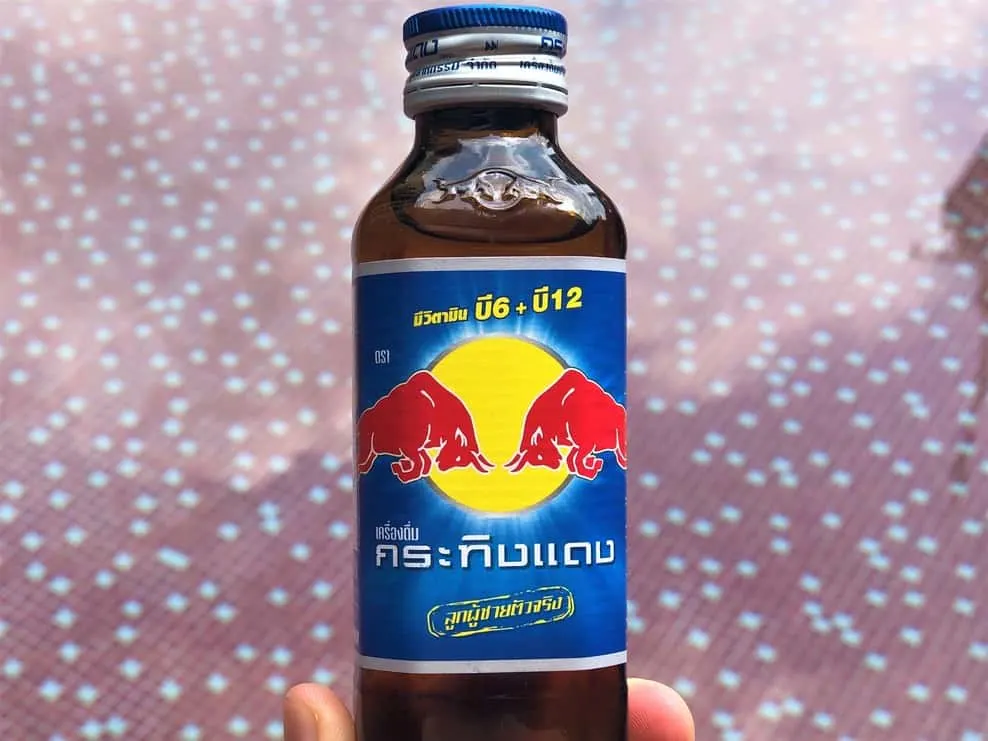While you may know the famous Red Bull Energy Drink, did you know that it’s actually inspired by a local drink from Thailand known as Krating Daeng, which, unsurprisingly, translates to ‘Red Bull’?
So if you ever find yourself in Thailand wondering if you should give the local variety of Red Bull a shot, here are a couple of facts about Krating Daeng’s caffeine and ingredients to get you started.
In brief, a standard 150ml/5fl.oz serving of Krating Daeng nets you 120 calories, 25.7g of sugar, and 50mg of caffeine, along with other nutrients like inositol, choline, and B-Vitamins for good measure.
For a more detailed look at the caffeine and ingredients of Thailand’s Red Bull, read on further down below:
Krating Daeng Nutrition Facts
Let’s start with a look at the nutrition facts of Krating Daeng:
| Value (Standard Serving) | Krating Daeng (150ml/5 fl.oz) |
| Energy | 120 calories |
| Protein | <1g |
| Fat | 0g |
| Carbohydrates (Of which Sugars) | 28g (25.7g) |
| Sodium | 160mg |
| Caffeine | 50mg |
| Choline | 10.5mg |
| Inositol | 30mg |
| Vitamin B2 (Riboflavin) | 0.7mg |
| Vitamin B3 (Niacin) | 21.5mg |
| Vitamin B5 (Pantothenic Acid) | 5.6mg |
| Vitamin B6 | 3.5mg |
| Vitamin B12 | 7.5μg |
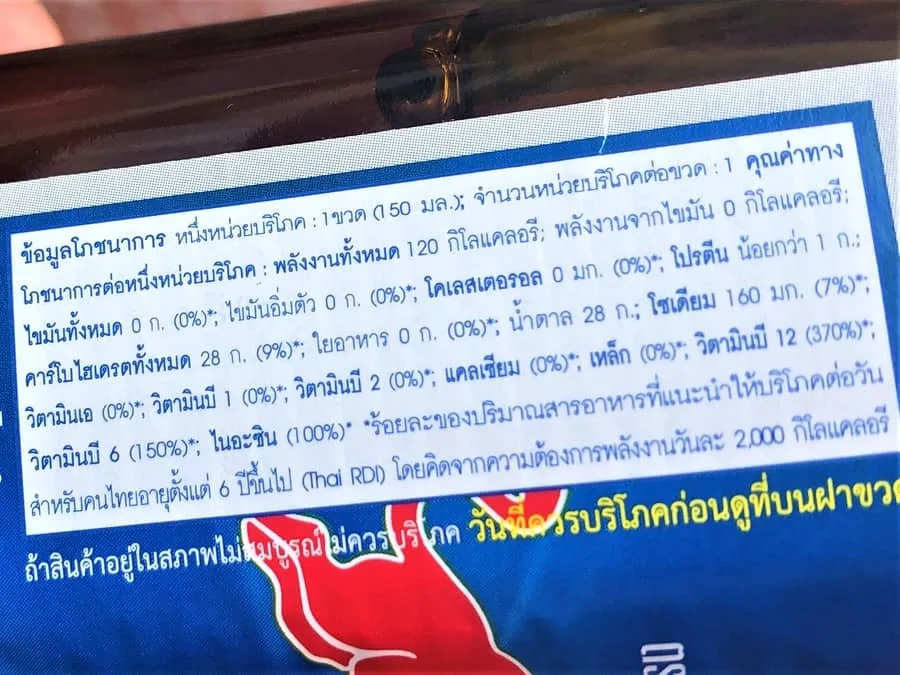
Krating Daeng Calorie Content
Each 5 fl. oz serving of Krating Daeng gives you about 120 calories, which is a large quantity of calories considering the size of the bottle.
For comparison, a standard 8.4 fl. oz can of Austrian Red Bull has 110 calories, which means that Krating Daeng has a slightly higher calorie per fl. oz count.
As you only need about 2000 to 2500 calories per day (depending on both biological factors and lifestyle choices), a serving of Krating Daeng gives your body some energy without being excessive.
Things change, however, when you have more than one serving of Krating Daeng, as all the small individual calories will eventually add up and have an effect on you.
So if you happen to be on a diet, be sure to keep your energy drink consumption at a reasonable level.
Furthermore, while a serving of Krating Daeng may work as a quick boost, it’s not viable if you need a proper meal due to the stark difference in both nutritional value and workable calories.
To conclude, having a bottle of Krating Daeng will definitely perk you up, but be sure not to have too many of them at any given time.
On the other hand, if you much rather your energy drinks be calorie-free, take a look at the article I’ve written on the best zero-calorie energy drinks for some notable alternatives.
Krating Daeng Ingredients
A comprehensive list of all of Krating Daeng’s ingredients, which share some similarities with the international Red Bull formula, is notable for the use of taurine and B-Vitamins.
For a more detailed look at the ingredients, check out the heading below.
- Sucrose
- Taurine
- Caffeine
- Choline
- Inositol
- Pantothenic Acid (Vitamin B5)
- Vitamin B6
- Vitamin B12
- Acid Regulators (INS 330)
- Preservative (NS 21)
- Synthetic Color and Flavorings
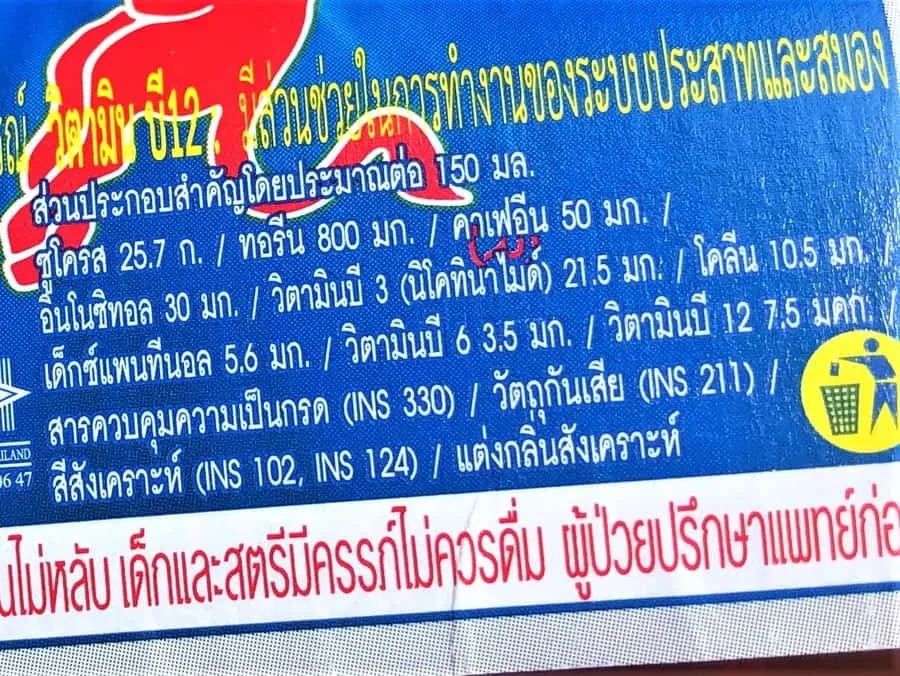
Krating Daeng Ingredient Analysis
Taurine
Widely used in energy drinks, taurine is an amino acid that’s noted to have a host of benefits, with Krating Daeng and Red Bull spearheading its use on the market.
Taurine and Red Bull practically go hand-in-hand, especially considering the prevalent rumour that their taurine content is derived from bull semen.
Fair warning, while the taurine content in International Red Bull is derived purely from synthetic sources, I couldn’t exactly find where Krating Daeng sources their taurine from.
Since it is unclear whether or not Krating Daeng’s taurine is suitable for vegans, those who have strict dietary requirements should probably steer clear.
As for the potential benefits of taurine, the list includes:
- Promoting healthy metabolism
- Improving exercise performance
- Protecting the muscles
That being said, the science doesn’t really confirm that there are any immediate benefits from having taurine in your diet, so do take these claims with a grain of salt.
Inositol
Inositol is a vitamin-like substance that’s responsible for maintaining the chemical balance in the body while also assisting with insulin function.
While inositol has a number of benefits, none of them seems useful in energy drinks, as research on inositol as a beneficial component in energy drinks is lacking or inconclusive.
But, given that there’s only 30mg of inositol present in Krating Daeng, you probably don’t have to worry too much about the ingredient affecting you negatively either.
Choline
Choline is an ingredient that is quite similar to B-Vitamins.
Among the potential benefits of Choline include:
- Improving memory and cognitive abilities
- Protecting heart health
- Increased metabolism
That said, you already get a decent amount of choline from a well-rounded meal, so if you’re eating healthily, the 10.5mg of choline in Krating Daeng is not essential.
B-Vitamins
B-Vitamins have become an essential part of any energy drink, so it’s not that surprising that it finds itself as part of Krating Daeng.
While definitely not comparable to proper B vitamin supplements, it’s still nice to have some B-Vitamins in your energy drinks, even if the benefits you might actually get from them aren’t immediate.
As for the B-Vitamin content in Krating Daeng, I’ve compiled a quick look at them in the table below:
| Purpose | Mother Energy Drink (500ml) | Tolerable Upper Intake Level | |
| Vitamin B3 (Niacin) | helps the body release energy keeps the skin healthy | 9mg | 35mg |
| Vitamin B5 (Pantothenic Acid) | builds and breaks down fatty acids, and other metabolic functions. | 3.3mg | – |
| Vitamin B6 | store energy from protein and carbohydrates aid in the formation of red blood cells | 1mg | 100mg |
| Vitamin B12 | release energy from food forms red blood cells keeps the nervous system healthy | 0.5μg | – |
Krating Daeng Caffeine Content
A regular 5fl. oz bottle of Krating Daeng has only 50mg of caffeine, which is definitely a lot milder than the energy drinks you would find on the international market.
Caffeine helps to keep you awake, improves cognition, and increases exercise performance, which is definitely pretty helpful.
Considering that some energy drinks have 300mg of caffeine per serving, a bottle of Krating Daeng is surprisingly low in caffeine, less than its international formula (80mg per 8.4 fl. oz).
As I prefer my energy drinks to have somewhere between 50mg to 100mg of caffeine per serving, a bottle of Krating Daeng works just fine for me from a caffeine standpoint.
That being said, everyone has a different tolerance towards caffeine, so if your caffeine metabolism is relatively high, you might need a couple of bottles before you get the same effects you’re used to.
Still, it’s best not to go too overboard with the caffeine.
The FDA recommends that you have no more than 400mg of caffeine per day as any more than that may lead to notable side effects such as:
- Insomnia
- Restlessness
- Headaches
- Stomachaches
- Dizziness
- Dehydration
- Anxiety
Considering that a bottle of Krating Daeng only has 50mg, you’ll be pretty hard-pressed to go over the caffeine limit even if you tried.
Therefore, if you do want to consume a caffeinated beverage, it is only necessary to limit yourself to a moderate amount throughout the day.
Krating Daeng Sugar Content
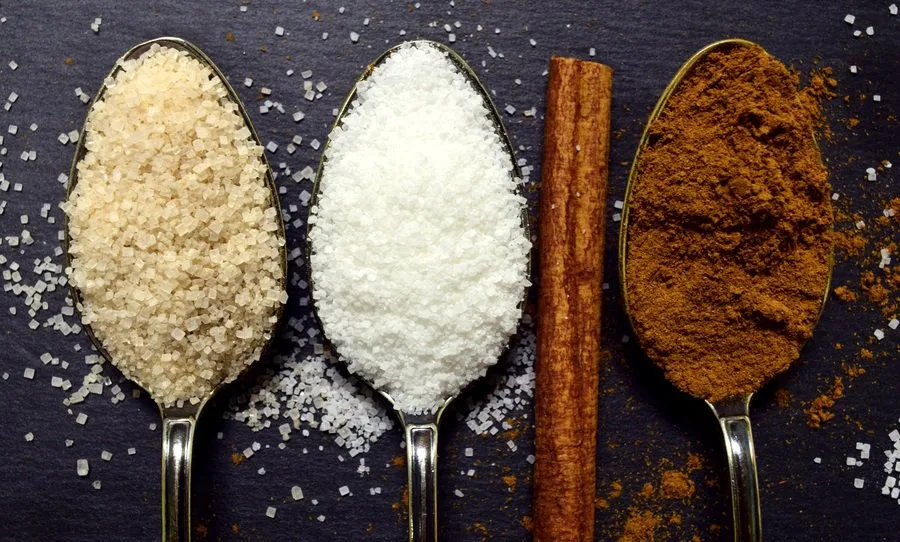
At 28g of sugar, Krating Daeng has a fairly reasonable amount of sugar (for a sugary energy drink), still having a high amount, but not excessive.
The AHA proposes a daily sugar intake of no more than 25g for women and 36g for men, while the UK’s NHS recommends a daily added sugar limit of 30g per day for adults generally.
As such, a 5 fl. oz bottle of Krating Daeng having 28g of sugar is actually a pretty high amount to be consuming on the regular, although it’s still within a reasonable amount.
Now that’s not to say you can’t go on a slight sugar binge occasionally; sugar is pretty tasty, and you also get a minor mood lift due to the dopamine boost you get from it.
It’s really only when you have a diet that’s consistently high in sugar that health problems might arise, with notable issues such as:
- Weight Gain
- Type II Diabetes
- Increased risk of heart disease
- Acne
- Increased risk of depression
Krating Daeng VS Red Bull?
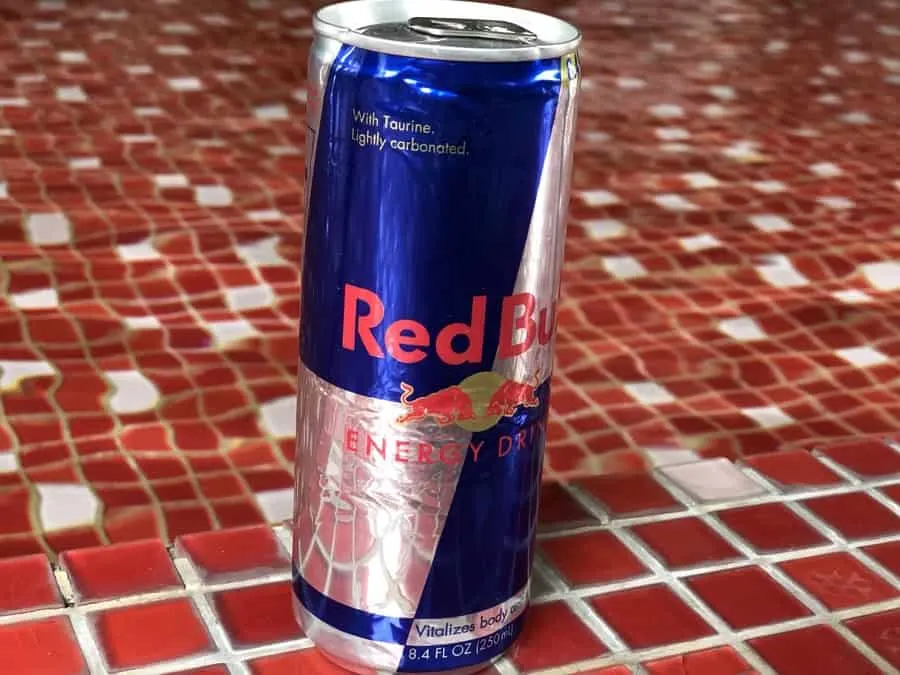
| Krating Daeng (5fl.oz) | Red Bull (8.4fl.oz) | Max Daily Limits (Female/Male) | |
| Calories | 120 calories | 110 calories | 2000/2500 calories |
| Caffeine | 50mg | 80mg | 400mg |
| Sugar | 25.7g | 27g | 25g/36g |
Based on their nutritional values, both Krating Daeng and Red Bull are fairly similar to each other, with any difference between them being quite minimal.
For a brief comparison:
- Krating Daeng has a slightly higher calorie content per serving compared to Red Bull (120 calories vs. 110 calories)
- Red Bull has more caffeine than Krating Daeng (80mg vs. 50mg)
- Red Bull has slightly more sugar than Krating Daeng (27g vs. 25.7g)
In terms of how it affects you, there’s really not that much difference between the two, so it ultimately boils down to personal preference, as to which Red Bull you prefer.
Is Thai Red Bull Stronger?
Based on the table above, both Krating Daeng and Red Bull seem to have a pretty similar nutrition value, with Red Bull having only 30mg more caffeine than Krating Daeng.
If you want a conclusive statement, Krating Daeng is actually slightly weaker than international Red Bull, due to having both a lower caffeine and sugar count in comparison.
Is Krating Daeng Bad For You?
So long as you’re not replacing most of your liquid intake with Krating Daeng (please don’t) and are relatively healthy, it’s fine to have one every day.
Krating Daeng is actually a lot milder than most international brands of energy drinks and even has caffeine values lower than a cup of coffee (95mg per serve average).
As such, Krating Daeng isn’t that bad for you as long as you have it responsibly. That said, there’s still quite a bit of sugar present in the drink, so you should always practice moderation.
All in all, if you happen to be an energy drink enthusiast who’s interested in the history of Red Bull, it’s definitely an experience getting your hands on Krating Daeng if not for the energy boost, then certainly for the bragging rights.
Krating Daeng Alternatives
Nothing beats the original, but here are some other great brands from the international market for you to try out as well:
- Celsius
- Bang
- Reign
- Rockstar
- Adrenaline Shoc
- C4 Energy
- G Fuel Cans
- Game Fuel
- Red Bull
- 5 Hour Energy
- Raze Energy
- Monster
- Uptime Energy
- Xyience
- 3D Energy
- Raze Energy
- C4 Energy
There are also some awesome powdered energy drinks as well if you prefer the flexibility of prepping your own servings.
- Advocare Spark
- G Fuel
- Zipfizz
- REIZE (my fav)
REIZE (10 out of 10)
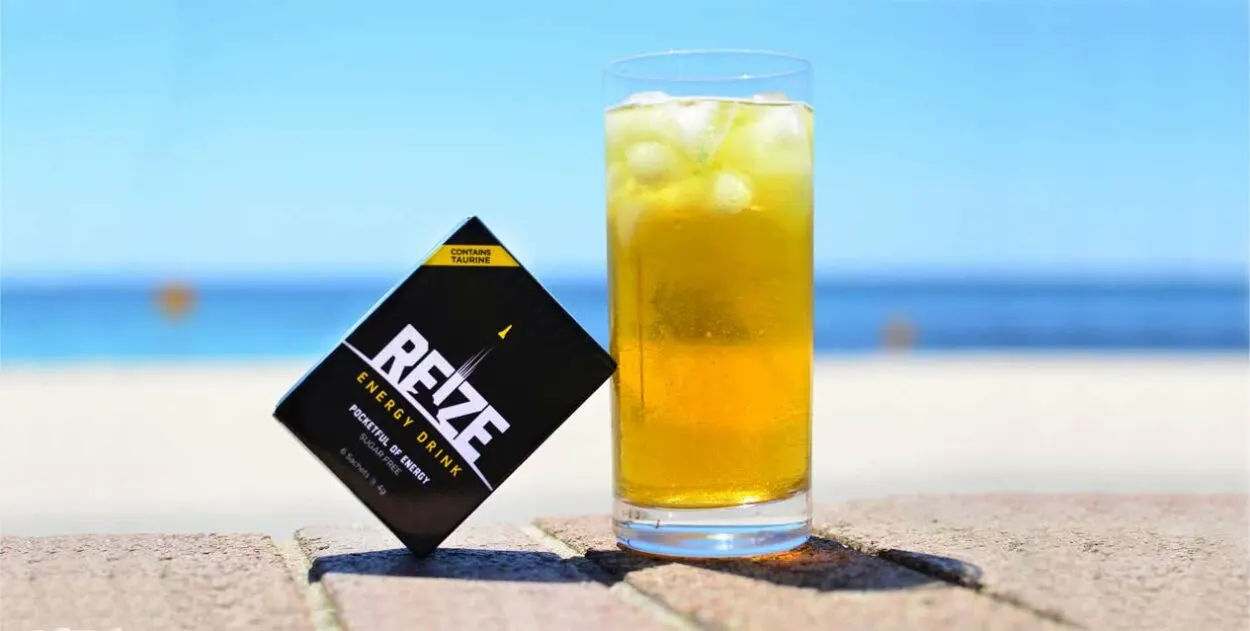
While you really can’t beat Krating Daeng as a local favourite, REIZE does bring its own unique properties to the table.
REIZE is a great powdered energy drink that comes in lightweight 4g sachets. With a sensible 50mg of caffeine, REIZE is completely sugar-free and has only 11 calories per serving.
REIZE also contains a smart blend of taurine, ginseng, and B-group vitamins. It’s the perfect energy drink mix, giving you the right amount of focus and energy without the sugar crash afterwards.
The best part?
You can get REIZE delivered straight to your door for only about $1 per drink, which is pretty great value for money.
So try out REIZE today, and you might find it a great alternative to Krating Daeng.

